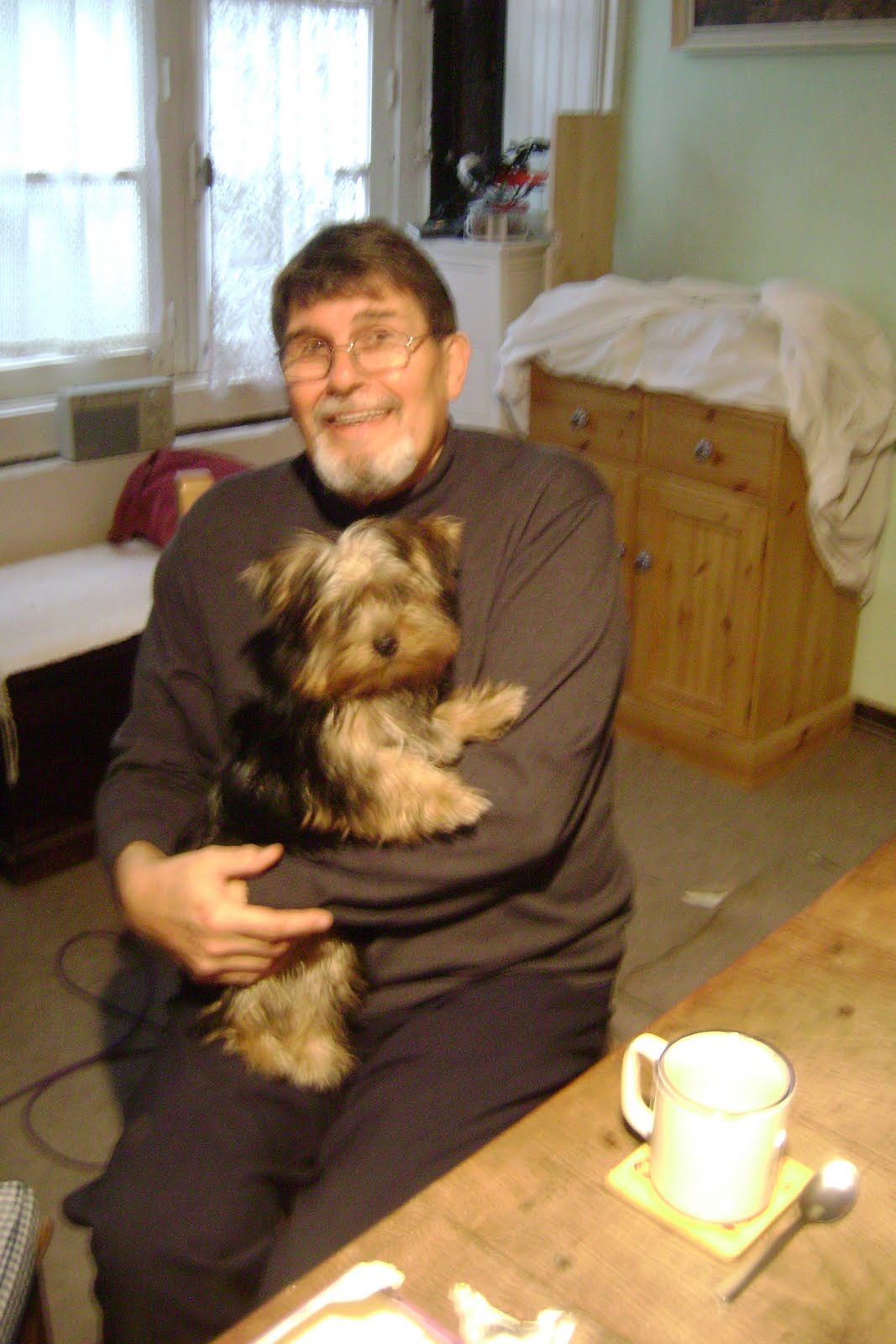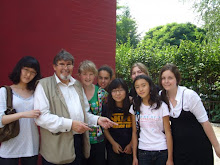When I look back to my own schooldays -after almost fifty years as a teacher - I realise just how much influence they had on my later life. Not intellectually, of course: anyone who has had dealings with me will know that I have no practical manual talents. I know nothing about Physics and Chemistry (one of my chemistry teachers, after having explained something at great length - and, possibly, very lucidly- regarded me with saddened eyes and exclaimed, "Holliday, you resemble a cow, staring over a five-barred gate.") I was thrown out of Biology, which may explain some of my future confusions; and any number of bank managers will testify to my complete failure to grasp the basic factors of Maths. All of which is rather sad since, it appears, my education started when was about two and a half years old.
I do not remember it, of course; but I was told that just after the war (that is World War 2 for the younger of my readers; I was born in November 1942, about the time of El Alamein: I like to think that news of my birth was instrumental in causing grave misgivings to Hitler and his chances of ruling the world); my mother and I (my father having been sent off as a medical officer to various parts of the world) were living in Southampton. My mother went off to work in an office somewhere and, since a baby sitter was impossible to find, used to hand me over, every morning, to a gtoup of Italian prisoners of war who looked after me and played with me until her return in the afternoon. Clearly, I did not learn any Italian from these encounters; but, equally clearly, they had a profound influence on later interests. In any case, this baby-sitting could not have lasted for too long, because I know I went to some sort of Nursery school in Southampton. Two memories, totally unconnected, surface every so often. In the first, I am running though a world of grey, that consisted of grey concrete beneath my feet and a thick fog that surrounded me. I am in a playground and I know I am running towards the main building. In my memory, I never reach it........although clearly I must have done, for my second memory is of being in a small room with a lot of other tots and grown ups. Someone is tying tiny red boxing gloves on my hands and then I am lifteda central space, surrounded by laughter and cheers. I don't like it and I am crying. Did I hit my opponent or did he hit me? I don't know. Probably not: I have always backed away from confrontation. And I have always detested boxing as a sport.
What schooling I had between then and five years old, I don't remember. I know that my father was back from the war and that he and my mother and I were living with Grandma and Grandpa Frank at 44, Burniston Road in Hull.And then, after that , we moved to Bridlington, and I went to Cliff House School
Cliff House School for Young Gentlemen and Ladies was run by two sisters, the Miss Potts. Miss Lucy Pott was the elder. Thin and scawny and with greying hair plaited into a coil over each ear, she ran the Lower class. Eventually , a young gentleman would graduate to the Senior class taught by Miss Jane, who was the complete antithesis to her sister: tall, slim and with jet balck hair, she made you think of Snow White. The school was in their home, a detached house with a big back garden on a quiet avenue not too far from the North beach of Bridlington and the path that led up the cliffs to Danes Dyke ( up which Hentietta Maria had neen rowed when she returned from Holland with treasure to support her husband, Charles I, in his fight against Cromwell.).
It was here that I learned the basics, especially how to do proper handwriting in ink, to spell, to enjoy words, to count, to learn my multiplication tables (OK until I got to eight times seven, and then it was downhill all the way), and where I looked at maps of the world on which were a lot of countries coloured in red. It was here that I was given my Doctor Barnardo's saving box, alittle cardboard cottage with hollyhocks round the door and a slot in the roof into which I put spare farthings and ha'pennies and pennies. On Dr Barnardo's Day, each young gentleman and lady, emptied the collected coins onto the oaken table and we had races to see who could pick up twelve pennies the fastest, until all had been totalled and Miss Lucy would show us the total amount collected on the blackboard.
It was here that I learned to be a polite young gentleman, to use correct vocabulary. One hot Summer day, I came in from playtime in the garden and cried out,"Ouf! I'm sweating!", only to be gently remonstrated by Miss Lucy, 3Christopher, horses sweat: gentlemen perspire". I have never forgotten.
It was here, I first preformed. I sang lustily in Singing lessons ("Christopher enjoys this" was written, rather ruefully, on my report. I liked poetry and in concerts staged once a year by the young gentlemen and ladies in the Tea and Coffee Rooms of the Lounge Cinema, I duly performed poems by Walter de la Mare .My favourite poem was "The Listeners" which I performed with suitable gestures and gusto. And there was a poem, which has long disappeared from memory, about a linnet in a cage, which I pitied and released, that, apparantlly, reduced a rather emotional matron in the audience to tears..........not of laughter, I hope.
I could only have been at Cliff House Scool for a couple of years but I think they were probably the most valuable years of my life as a child. Schools like Cliff House disappeared and are now probably regarded as relics of a former age, and laughed at, patronisingly. But I learned there that one should never lie ( I still cannot tell a lie - or if I do, then everyone will know from my gauche stuttering and scarlet face), that other people come first, that ladies should enter a room before a gentleman, should not carry heavy articles and should be respected at all times (well, I am not sure that the last point has been adhered to). It is a world captured in the books of Miss Read and which is now derided. But I felt safe there, and when I went onto Moorfield Primary School, i was ahead of the other children in my year group.
Moorfield was the primary school with two playgrounds (one for girls and one for boys) and two separate entrances (one for boys and one for girls. It was where I met Dorothy Woods, who lived just round the corner from St Anthony Road. She is important in my life in that she was the first girl that I ever kissed - well, in truth, she kissed me, and I didn't like it much. Much more important people there were Mrs Ingle, Mr Penkethman and Miss Senior, the three teachers I had there. I thought they were wonderful and knew everything. No matter what you asked, they had an answer. Mr Penkethman put me in my first play. It was a Nativity and I played a little boy who arrived at Jesus' birth and was sad because I did not have a gift for him: a role I overplayed to its sentimental hilt. I was awful, but I loved being in front of an audience.
In those days, in a child's last year at a Primary school, there was the 11+ exam which decided whether a child went on to a Grammar School or to a Secondary Modern School. Grammar Schools led onto scholastic futures, Secondary Modern Schools were for children with more practical talents. Most ambitious parents wanted their children to go to Grammar schools. I was in Miss Senior's class and knew that I had at least another year to go before I had to take the 11+ exam. However, one day, I arrived in her class and with three or four other boys was sent to another classroom to sit a series of tests. It did not mean very much to me; but, then, in the summer term, she called me to her desk at the front of the class, and told me that I had passed the 11+ and therefore had been selected for a grammar School education. Would I like to run home with this letter and tell my mother? (How difficult to believe today that a child of ten would be allowed to leave school unaccompanied - the very fact speaks volumes about how the world has changed.)
I ran all the way, down the fenced gunnel that separated the terraced houses from Bridlington Town Football club, turned right onto the top of Queensgate, dashed across the dual carriageway and along the road that went past the playing fields of the Secondary Modern School. I dived down St Anthony Road to our house and pushed at the back door of Number 10. It was locked.
Disconsolate, I went and sat on the front doorstep. The door opened. My mother was coming out to go shopping and was surprised to see me. I gave her the letter and gabbled out what Miss Senior had told me. She hugged me and said "Let's ring Granny Frank in Hull"
Later, when my father came home, we read all the details that Miss Senior had given me. I had to make a choice from several schools in the East Yorkshire area, including Bridlington Grammar School. But I knew I did not want to go there. I had done my reading of Enid Blyton. Mallory Towers seemed a lot of fun. I knew where I wanted to go.
I wanted to go to Boarding School
I looked at the details and I decided on Archbishop Holgate's School in York. It sounded really great.
And that was where I would be going to school in September 1953.
Cambodia's Holocaust
15 years ago


Mommy (Joan) prepared us really well for our eventual stay in boarding school. Almost two years before Beth and I went, she supplied us with all the Enid Blytons, which I devoured with gusto. I became very eager to attend boarding school!
ReplyDelete